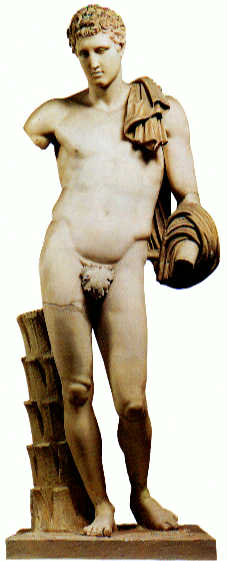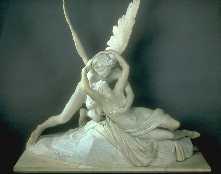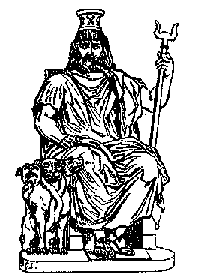|

f |
 |
Venus (Goddess of love) |
In the Greek Mythology Aphrodite |
As the goddess of love, Venus is the "queen of pleasure" and mother of the
Roman people. Possibly the daughter of Jupiter, she was the daughter of
Dione. Venus was the wife of Vulcan, god of metalwork, but she was often
unfaithful to him. Among her many lovers were Mars, the god of war; and
the handsome shepherd Adonis. Venus was also the mother (by Mercury) of
Cupid, god of love. She was the goddess of chastity in women, despite the
fact that she had many affairs with both gods and mortals. As Venus Genetrix,
she was worshiped as the mother (by Anchises) of the hero Aeneas, the founder
of the Roman people; as Venus Felix, the bringer of good fortune; as Venus
Victrix, the bringer of victory; and as Venus Verticordia, the protector
of feminine chastity. Venus is also a nature goddess, associated with the
arrival of spring. She is the bringer of joy to gods and humans. Venus really
had no myths of her own but was so closely identified with the Greek Aphrodite
that she "took over" Aphrodite's myths. |
| Mercurius (God of trade) |
In the Greek Mythology Hermes |
 |
Mercury was the son of Jupiter and of Maia, the daughter of the Titan Atlas.
He was the messenger of the gods. Mercury was also the god of merchants
and of trading, and shared many of the attributes of the Greek god Hermes.He
was often depicted holding a purse, to symbolize his business functions.
|
4444444444444 |

|
 |
Mars (God of the war) |
In the Greek Mythology Ares |
The son of Jupiter and Juno, he was the god of war. Mars was regarded as
the father of the Roman people because he was the father of Romulus, the
legendary founder of Rome, and husband to Bellona. He was the most prominent
of the military gods that were worshipped by the Roman legions. The martial
Romans considered him second in importance only to Jupiter. His festivals
were held in March (named for him) and October. Mars was identified with
the Greek Ares. |
| Jupiter (Father of the Roman gods) |
In the Greek Mythology Zeus |
 |
King of the Roman gods, son of Saturn (whom he overthrew) and Ops, brother
and husband of Juno. He was particularly concerned with oaths, treaties,
confederations and with the most ancient and sacred form of marriage. Jupiter,
the name, is derived from the same root word as Zeus (bright). He was improperly
called Jove also. Originally the god of the sky, Jupiter was worshiped as
god of rain, thunder, and lightning. He developed into the prime protector
of the state, and as the protector of Rome he was called Jupiter Optimus
Maximus. As Jupiter Fidius he was guardian of law, defender of truth, and
protector of justice and virtue. The Romans identified Jupiter with Zeus,
the supreme god of the Greeks, and assigned to the Roman god the attributes
and myths of the Greek divinity; the Jupiter of Latin literature, therefore,
has many Greek characteristics, but the Jupiter of Roman religious worship
remained substantially untouched by the Greek influence. With the goddeses
Juno and Minerva, Jupiter formed the triad whose worship was the central
cult of the Roman state. |

|

|
 |
Neptunus (God of the sea) |
In the Greek Mythology Poseidon |
Son of Saturn, and brother to Jupiter and Pluto. God of the sea. Usually
shown carrying a trident and rising from the sea.His Greek mythology counterpart
was Poseidon. |
|
|
|
|
|
|
|
|
|
|


![]()




